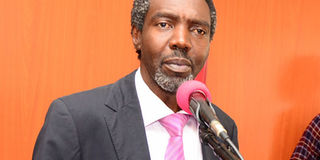Fight for legitimacy at UPC: Otunnu vs Akena

MP Jimmy Akena
KAMPALA.
Officially, Uganda Peoples Congress is a house divided, with two camps claiming legitimacy for the party’s leadership.
One group is led by Olara Otunnu while the other is led by Jimmy Akena, son of the founding father and two-time president of Uganda, Apollo Milton Obote, who was controversially elected as presumptive president by the party’s district conference before later assuming full control. Both camps claim leadership of the party and have been at loggerheads.
In what his opponents described as a coup, Akena forcefully assumed control of UPC headquarters and was sworn in as president.
Okello Lucima, the spokesperson for the Otunnu faction, which these days seems to operate out of hotel rooms, maintains that Akena was never elected UPC president but only participated in a candidate nomination process which was never concluded.
“This was carried out under Art. 11.2(6) of the UPC constitution, where the district conferences were to nominate, by majority vote, a candidate for the party presidency,” he said in a statement.
He adds that a candidate(s), who meets the threshold of one third of all the district conferences, would then be “a nominated candidate or candidates, to be presented to the party delegates conference for election of a party president, in accordance with Art 13.1(5) of the party constitution”, something he says was thwarted by Akena’s pre-emptive actions.
In response to Lucima’s claims, Micheal Osinde, the spokesman for the Akena group at Uganda House, simply said: “Mr Akena is the undisputed president of UPC and there is no such thing as factions in the party.”
TDA sucked in
The divisions at UPC have sucked in the Opposition coalition, The Democratic Alliance (TDA), with the Otunnu faction maintaining that the party joined the alliance while Akena’s people want out. On August 15, a UPC national council meeting convened by the Akena faction unanimously resolved to quit the TDA protocol that was signed by Otunnu, officially putting to question the membership of UPC in the alliance.
During the official launch of the alliance on June 10, Otunnu (whose term as party leader had ran out) declined to append his signature to the TDA protocol on behalf of UPC, stating that he needed the authorisation of UPC’s national council.
“UPC as a party and I as a leader have been deeply involved in the togetherness project since 2011. In the UPC constitution, this constitutes a major policy issue which has to be debated by the UPC national council. It is due to meet and the matter is top on agenda.”
While the national council never sat, Otunnu later appended his signature to the protocol, making UPC a member of the alliance.
“Why did Otunnu refuse to sign the TDA protocol?” Osinde asks.
“He knew he was no longer president of UPC and so did not have the powers to sign. He went behind the back of UPC and signed. We don’t want to play carrot and stick politics,” Osinde added.
So when Akena’s faction organised their meeting, 359 delegates voted for the party to withdraw from the protocol of TDA, against two delegates who voted for the party to remain in the alliance.
However, 329 delegates opined in a vote that they would only associate with the alliance at the presidential level, on condition that Akena is considered the choice for the joint presidential candidate of TDA. They made it clear that if TDA ignores Akena as a joint Opposition candidate, then they have nothing to do with the alliance. Only 14 disagreed with the move.
Akena himself told the delegates that he had reservations about fully engaging with TDA.
The Otunnu, group on the other hand, continues to be represented in the various TDA meetings by Joseph Bbosa and others. Bbosa was and is vice president in the Otunnu UPC faction and contested with Akena and others before distancing himself from the process where Mr Akena was controversially declared UPC president.
Reconciliation?
During the Akena-faction national council meeting, a motion was moved to establish a mediation and reconciliation commission to iron out the differences within the UPC. A seven-member commission with some UPC old hands was appointed. They include Yonasani Kanyomozi (former UPC national chairman), Bishop Alfred Okodi (West Lango Diocese) and Rev. Dr Charles Bernard Obaikol (retired bishop of Soroti).
Others are Benjamin Olar Ameda, Wilson Busingye and Miria Muhwezi.
Dr James Rwanyarare, who was part of a committee Otunnu appointed to investigate the district nominations, was also appointed, although he was yet to be consulted.
However, some of the members on the Otunnu-appointed commission, including its chairman Patrick Rubaihayo and Mr Peter Walubiri, have been referred to the UPC disciplinary committee “for breach of trust and duty as representative of the party in the MOF.” MOF is the acronym for the Milton Obote Foundation.
The problems occasioned by the Akena vs Otunnu feud have also sucked in the management of MOF, the main sponsor of UPC. The foundation has sued the Akena faction for trespassing on Uganda House, among other things.
The case has come up in the High Court in Kampala, where it was adjourned till September 3, with court maintaining the status quo at Uganda House until the application is disposed of.
The Akena group maintains that their opponents are using MOF to force them out of Uganda House, something they have vowed to fight. In the meantime, UPC titters on the edge.




